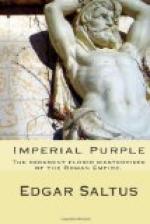The procession that presently entered the gates was a stream of splendor; crowns of rubies and gold; garments that glistened with gems; gods on their sacred pedestals; prisoners; curious beasts; Jerusalem in miniature; pictures of war; booty from the Temple, the veil, the candelabra, the cups of gold and the Book of the Law. To the rear rumbled the triumphal car, in which laurelled and mantled Titus stood, Vespasian at his side; while, in the distance, on horseback, came Domitian—a supernumerary, ignored by the crowd.
When the prisoners disappeared in the Tullianum and a herald shouted, “They have lived!” Domitian returned to the palace and hunted morosely for flies. The excesses of the festival in which Rome was swooning then had no delights for him. Presently the moon would rise, and then on the deserted terrace perhaps he would bathe a little in her light, and dream again of Pallas and of the possibilities of an emperor’s sway, but meanwhile those blue troubled eyes that Psyche was amorous of were filled with envy and with hate. It was not that he begrudged Titus the triumph. The man who had disposed of a million Jews deserved not one triumph, but ten. It was the purple that haunted him.
Domitian was then in the early twenties. The Temple of Peace was ascending; the Temple of Janus was closed; the empire was at rest. Side by side with Vespasian, Titus ruled. From the Euphrates came the rumor of some vague revolt. Domitian thought he would like to quell it. He was requested to keep quiet. It occurred to him that his father ought to be ashamed of himself to reign so long. He was requested to vacate his apartment. There were dumb plots in dark cellars, of which only the echo of a whisper has descended to us, but which at the time were quite loud enough to reach Vespasian’s ears. Titus interceded. Domitian was requested to behave.
For a while he prowled in the moonlight. He had been too precipitate, he decided, and to allay suspicion presently he went about in society, mingling his hours with those of married women. Manifestly his ways had mended. But Vespasian was uneasy. A comet had appeared. The doors of the imperial mausoleum had opened of themselves, besides, he was not well. The robust and hardy soldier, suddenly without tangible cause, felt his strength give way. “It is nothing,” his physician said; “a slight attack of fever.” Vespasian shook his head; he knew things of which the physician was ignorant. “It is death,” he answered, “and an emperor should meet it standing.”
Titus’ turn came next. A violent, headstrong, handsome, rapacious prince, terribly prodigal, thoroughly Oriental, surrounded by dancers and mignons, living in state with a queen for mistress, startling even Rome with the uproar of his debauches—no sooner was Vespasian gone than presto! the queen went home, the dancers disappeared, the debauches ceased, and a ruler appeared who declared he had lost a day that a good action had not marked; a ruler who could announce that no one should leave his presence depressed.




